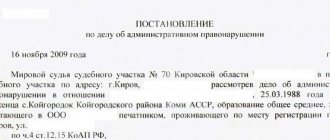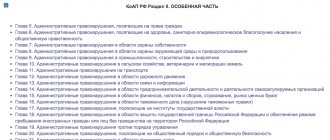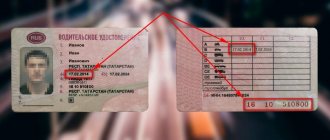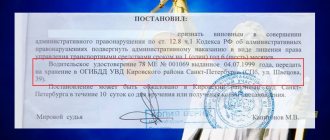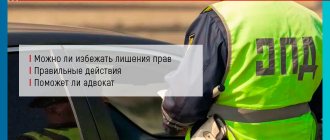Free legal consultation over the Internet 24 hoursLawyer on housing issues in St. Petersburg. Free legal consultation on labor disputes.
5/5 (7)
How to obtain a decree on deprivation of a driver's license
If a situation arises in which a court deprives a citizen of a driver’s license, you should remember the need to obtain the appropriate ruling. The importance of such actions is that subsequently, if there is such a resolution, you will need to submit your license to the traffic police.
And the problem is that in most cases such documents are sent electronically directly from the court to the traffic police officer, which makes it difficult to directly receive the decision in hand.
Important! To obtain the document as soon as possible, you should contact the office of the judicial authority directly. To obtain a copy of the required resolution, you will need to write an application on the spot.
If the offender was present at the court hearing, then a copy of the document can be issued immediately after the hearing against signature. If the person was absent from the courtroom, a copy will be sent to him no later than five days later.
Some citizens are seeking to find a resolution in order to regain their rights. In fact, there is no need to present a decree to return rights. To do this, just get a medical certificate, a passport and contact the traffic police.
When does the period of deprivation of a driver's license begin if the license is in hand?
What happens to driving without a license after it is revoked, read here.
How to appeal the traffic police protocol if you do not agree, read the link:
Progress of the trial
The process is open and anyone interested can find out how the trial for deprivation of a driver's license takes place while in the courtroom. It is carried out in accordance with Chapters 24 and 25 of the Code of Administrative Offenses of the Russian Federation.
If the person involved has convincing arguments in his defense, he must go to court and present them. They can be heard and taken into account when making a decision.
When the trial for deprivation of rights will take place, you can find out either from the received summons, SMS message, telephone call, or by personally contacting the office.
The notification about the time of consideration of the case, for various reasons, may not reach the addressee. Then the case will take place without the participation of the person held accountable, and will definitely end not in his favor. Therefore, it is better to inquire about the time of consideration of the case in advance and appear without delay.
Administrative
the judicial process is not very different from the procedure used by an arbitration or civil court. Only all this happens fleetingly in a truncated form.
The law defines the following procedure for a court hearing:
- it is announced what case is being considered and by whom - the last name, first name, patronymic of the judge and secretary;
- the fact of attendance of the person involved and other interested parties is established;
- the powers of the representatives are clarified;
- rights and responsibilities are explained;
- submitted challenges and petitions are considered;
- If necessary, a number of other procedures are carried out.
After this, the court reads out the protocol on the offense. Next, the person involved, his representatives, witnesses, experts, and specialists are heard. Then the court finally reads out all the materials of the case, finds out whether there are any additions and goes into the deliberation room. There he makes one of two decisions: either he makes a decision to deprive him of the right to drive a vehicle, or to terminate the case.
How to find out about the court decision if you didn’t go to court
There are often cases when a citizen did not appear in court at all, and a decision was eventually made.
To find out the verdict and obtain the necessary documents, the best option would be to personally contact the court that heard the case.
It is also possible to track the progress of the case on the court website. All you have to do is log in and find the case you need by number. There should be a calendar display of when the meeting took place, when and what resolution or determination was made, and so on. A resource such as “Justice” will help you find the necessary website, where all the courts by region and district are concentrated.
Attention! Our qualified lawyers will assist you free of charge and around the clock on any issues. Find out more here.
Is it necessary to obtain a court decision on deprivation of VP at all?
Having a court order in hand is necessary, since the culprit can not only use this document to execute the order, but also apply other procedural measures. One of them is an appeal.
You should remember to correctly reflect the beginning of the sentence, since deprivation of rights is valid only for a certain period of time. Accordingly, as soon as the guilty driver receives a court order, the deadline for fulfilling the order specified in the document begins to expire.
There is also always a need to pay an additional monetary penalty in the form of a fine. The resolution makes it possible to determine the deadlines for this, because if these are violated, the person will be held administratively liable and the amount of the fine will be doubled.
Along with the decision, the person presents his identification card to the traffic police officer, which the person is deprived of before the expiration of a specifically established period.
Notice! When a citizen continues to drive with such a certificate, the traffic police inspector has the right and even the obligation to confiscate the driver’s license and also bring the violator to additional administrative penalties.
Accordingly, the presence of a resolution in the hands of the violator is necessary not only in the case when the citizen plans to file an appeal. This document also facilitates the timely execution of court orders.
The procedure for deprivation of rights
The first step is to create an admin. protocol. The basis for its preparation may be the identification by the inspector of an offense committed by the person driving the vehicle, and for which the legislation of the Russian Federation provides for deprivation of rights. After stopping the car, the inspector must draw up a report on the administrative offense against the violator on the spot. These actions are regulated by Order of the Ministry of Internal Affairs of Russia N 185; and Code of Administrative Offenses of the Russian Federation
The date, place and time when the offense was committed are entered into the protocol. The personal data of the inspector and the violator, as well as information about witnesses, are indicated. The document must reflect the circumstances and details of the offense, traffic rules that, according to the inspector, were violated by the driver, as well as the legal grounds prescribed in the Code of Administrative Offenses of the Russian Federation, establishing administrative liability for this type of violation.
The inspector’s responsibility is to explain to the driver the rights enshrined in current legislation and his right to include in the protocol any explanations or objections that relate to the offense charged to him.
The person managing the vehicle is also given the right to petition for his case to be administrated. violation was sent for consideration to the area of his residence. Such a request is indicated in the protocol. This rule is established by the norms of the Code of Administrative Offenses, as well as by the Administrative Regulations. If the petition is granted, the case must be sent to the judicial authority located in the violator’s area of residence.
The protocol is a document that must be signed by the inspector, the person in respect of whom it was drawn up, and witnesses, if any. According to the rules prescribed by the Code of Administrative Offences, the protocol must be handed over to the driver.
Important! In accordance with the law, the inspector does not have the right to confiscate a driver’s license.
When the decision on deprivation of VP comes into force
In order to correctly determine when to transfer the certificate to the traffic police, you need to determine the moment the court decision comes into force. For this category of cases, a time period of ten days applies.
The decision is announced, ten days pass, after which the person is obliged to comply with the order. If the challenge procedure is implemented, the resolution does not enter into force.
So that the court can track the moment a citizen receives a decision, if postal service is used to transfer documents, upon receipt of the decision the person must sign his actions, which the postal employee will eventually report with a special notification to the judicial authority. The moment of receipt serves as the starting point for the appeal.
It should be understood that simply obtaining a resolution is enough; the fact of familiarization with the contents of the document will not play a role in counting the above period.
Watch the video. How many days after deprivation do you need to surrender your driver's license?
Do I need to surrender my license immediately after the ruling is made?
The procedure for submitting your license to the traffic police is limited to a specifically established period. The citizen is obliged, no later than three days from the date of the decision and entry into force, to transfer the certificate to the traffic police. However, during the specified days, the culprit has every right to use the document and drive a car.
In what cases can you deprive your license for LED lamps in headlights and how to avoid this?
Is it possible to avoid receiving a decision?
What to do if the resolution has not been received? This fact will not relieve the violator from the need to fulfill the duties assigned to him. If a citizen deliberately avoids receiving a letter, indicated an incorrect address in advance, or provided other conditions for the decision to be delivered, then the letter will eventually be returned to the court with an appropriate note.
According to the explanations of the Supreme Court of the Russian Federation, after the letter is returned, the period for the resolution to enter into force will begin to expire. It should be understood that before sending the envelope back to the judicial authority, it is stored at the post office for thirty days, as expressly stated in the Order of the Ministry of Telecom and Mass Communications of the Russian Federation. That is, even if you refuse to accept the document, it will still come into force, but after a longer period of time.
Accordingly, the situation develops in such a way that if a letter is refused, the person is deprived of the right to appeal the decision and will not know when the decision comes into force, what is the procedure for executing the instructions, and so on.
Important! If a person does not surrender his license, this is not considered a violation, but if a person gets behind the wheel with such a license, then as a result the person will be fined and the car will be sent to the impound lot.
Withdrawal of rights
When everyone agrees with the court's decision to revoke a driver's license, it takes effect after 10 days. In case of appeal - immediately after the appeal consideration.
Many questions arise due to the fact that it is not clear how many days you can drive after a trial, after deprivation of your license. The answer is simple - not a single day. The law allows three working days to pass the license, but this does not mean that you can drive. If information about the deprivation of rights is in the database, then in addition you will receive an administrative arrest for up to 15 days.
The ID is no longer taken away. You must personally appear at the traffic police office and hand it over. Failure to submit on time will suspend the period for deprivation of rights.
It is not difficult to lose your driver's license. But it’s much more difficult to return it - you have to pass a theoretical exam. If you are deprived of your license for drunkenness, you are now required to undergo a medical examination and submit a medical certificate stating that there are no contraindications for driving a car.
What to do if the document is lost
The ruling is necessary when fulfilling the duties assigned to the guilty person by the court. However, it may often be required when a person comes for an identification, since some services ask not only for a passport and medical certificate, but also for a previously made decision. But what to do if the resolution was lost?
In case of loss of procedural documents, you can request a duplicate by submitting an application to the judicial authority that once made the decision. However, this will require payment of a state fee.
In addition, you should remember the need to preserve all papers and even familiarize yourself with the case materials, because when returning rights or, conversely, confiscating them, the inspector may also require a protocol recording the offense.
Where can I pick up my license after the expiration period?
When a court deprives a driver of the right to drive a vehicle, it issues a corresponding decision, which indicates exactly where the owner of the car must surrender his driver’s license. This applies to both a standard driver's license, which is valid for 10 years, and a temporary driver's license. After handing over your license, information about the location of their storage will be entered into a special traffic police database.
After the expiration of the period of deprivation, the driver's license can be returned exactly to the department of the State Traffic Inspectorate where they were handed over. But what to do if the driver is in another city at the end of the license withdrawal period and there is no way to visit the traffic police department to which the license was handed over? There are 2 options:
- In advance, 30 days before the end of the period of deprivation of the driver's license, send an application to the traffic police department at your current place of registration with a request to send the license by mail from another city. Since postal services are often slow, it is better to send such an application as early as possible;
- Send an application to the traffic police department at the place where the court order was executed with a request to forward the license to the department located at your current place of residence. In the application you must indicate detailed postal details of your new department of the State Traffic Inspectorate.
The specified application can be handed over by the driver personally to the duty officer, and also sent by registered mail or handed over by the driver’s legal representative.
What to do after receiving a deprivation of rights order
Based on the results of the consideration of the case of an administrative offense committed on the road, the court can either “acquit” the citizen by terminating the proceedings, or make a decision to deprive him of his driver’s license for a specifically established period of time.
Such a court decision obliges the culprit to follow the instructions contained in the resolution, otherwise the person will face additional administrative penalties.
Please note! In the first case, only ten days are given to appeal the decision, which can reach the final supervisory authority and the Supreme Court. During this time, the citizen can freely use the car and driver’s license, despite the fact that guilt in the incident has been proven. Next, the person is obliged to hand over the license to the traffic police or keep it with him, but not use the vehicle.
If the citizen has not taken any measures to appeal the decision, then eventually it comes into force. After ten days, a person will no longer be able to use his vehicle, and violation of this rule will result in a doubling of the fine and confiscation of the vehicle. The period for deprivation of the certificate will expire not from the moment the resolution comes into force, but from the day when the certificate was transferred to the traffic police.
Since after a driver’s license has been confiscated from a person, the citizen cannot drive a vehicle, if the specified order is established, he will be subject to a fine of thirty thousand rubles. It is also possible to apply arrest for fifteen days or forced labor for up to two hundred hours.
Appealing the decision
In order to appeal a court decision on deprivation of a driver’s license, you need to familiarize yourself with it, look at its reasoning part, where you should pay attention to possible discrepancies with the case materials, primarily with the protocol.
A higher court may overturn a magistrate's decision if it comes to the conclusion that its reasoning does not correspond to the actual circumstances of the case and guilt has not been proven. Cancellation may also be due to procedural violations.
Ten days are given to appeal. An appeal against a magistrate's decision to deprive a driver's license is filed with a higher court of appeal.
This can be done by mail - by registered mail with an inventory - or you can personally come to the office of the magistrate and hand it in with a mark on the second copy.
In cases of deprivation of rights, an appeal against a decision that has entered into legal force is possible in all higher courts, up to the Supreme Court of the Russian Federation.
The prosecutor, in case of disagreement with the court decision, can appeal it, also in all courts, up to the Supreme Court.
How to appeal a court decision
The procedure for appealing a court decision is regulated by civil procedural law. The appeal must be sent in the form of a corresponding complaint no later than ten days from the moment the court ruling was made. Once the decision has entered into force, no appeal is allowed.
If the last day of the specified period is a weekend or holiday, then the final day will be the next one. Only if there are good reasons, which will be assessed by the court, can the period of time established for appeal be extended. To do this, you will need to send a request and attach evidence confirming the valid reasons for skipping.
Important! An appeal is allowed in specifically established circumstances, namely:
- identifying errors in court documents that relate to information about the driver acting as the culprit of the offense;
- the case was considered in violation of the procedural rules provided for by current legislation;
- the court ignored certain information that could have acted as an exculpatory factor for the perpetrator of the incident, which also must be confirmed;
- non-compliance with the procedural order of preparation and conduct of the trial. Consideration of a case in court without a participant who did not appear due to the lack of proper notification of the hearing.
The appeal will be sent taking into account which court made the decision. It is there that the application is submitted, and then transferred to the jurisdiction of an employee of the authorized body.
The appeal can be carried out in person, through the involvement of a representative with a properly executed power of attorney.
In this case, the complaint may be rejected for the following reasons:
- any of the documents necessary for the case are missing;
- there is no fact of payment of the state duty;
- the identified deficiencies were not eliminated within five days;
- The period of time allowing for filing an appeal has expired.
The court makes an appropriate decision regarding its refusal, where it substantiates this position and sends the decision to the applicant and other participants in the process.
Attention! According to general rules, the period for consideration of an appeal is two months. Depending on the circumstances of the case, it may be extended. If the appeal is carried out in the Supreme Court of the Russian Federation, then the initial period for consideration of the application is three months
How does the procedure work?
The first step is to draw up an administrative protocol based on a violation identified by a traffic police officer committed by the driver of a car, for which the law provides for this type of punishment. This protocol is drawn up by a traffic police officer directly at the place where the car was stopped, in the presence of the offender, which complies with the requirements of Order of the Ministry of Internal Affairs of the Russian Federation No. 185 and the Code of the Russian Federation on Administrative Offenses.
This document must contain information about the date, time and place of the violation; in addition, it contains personal information about the traffic police officer and the driver, as well as witnesses, if any. The protocol fully describes all the circumstances of the offense, lists the provisions of the Traffic Rules that were violated by the driver, as well as the norms and provisions of the Code of Administrative Offenses of the Russian Federation that establish this specific type of punishment for committing such a violation.
The traffic police officer must clearly explain to the car owner his civil rights according to the law, and also include in the document all the explanations and objections of the car owner regarding the violation.
A citizen who has violated traffic rules has the right to petition for consideration of a case of an administrative offense at the place of registration, and this information must be reflected in the protocol, based on the requirements of the Code of Administrative Offenses and the Administrative Regulations. If the decision is positive and the petition is granted, the case will be transferred to the judicial authority operating at the place of residence of the perpetrator.
The protocol itself must be certified by the traffic police inspector, the car owner and witnesses, if any. According to the rules of the Code of Administrative Offenses, this document must be handed over to the driver.
It is important to know that the inspector is not authorized by the legislation of the Russian Federation to independently confiscate your rights.
Transferring a case of an administrative offense to court
Within 3 days after drawing up the protocol, all case materials on this offense are transferred to the courts. Under the current procedure, such cases are usually considered by magistrates. But when all materials (photos and videos, diagrams, protocols, certificates, etc.) are redirected to the place of registration of the violator (in case of a positive decision on the petition), the case will be transferred on a territorial basis.
Procedure for considering a case of an administrative offense
So, the court accepts the received materials for proceedings and sets a date and time for the hearing, necessarily notifying the violator. According to the current legislation of the Russian Federation, the case must be considered with the personal participation of the offender, whom the court brings to justice. However, in the event of his failure to appear and if there is confirmation that he was actually notified of the date and time of the consideration, the case will be considered without his personal presence.
Important to remember
: what exactly is considered a valid notification of date and time can be found in Art. 113 Code of Civil Procedure of the Russian Federation. When considering a case, the driver has the right to provide evidence in defense of his rights, give explanations, materials, demand evidence if he cannot provide it on his own, demand case materials for review, and also use his procedural rights.
It is important to know
: The driver is presumed to be innocent from the start until proven otherwise, which means he does not have to prove his innocence. If there are irremovable doubts that a citizen is guilty, then they will be interpreted by the court in his favor. Based on the results of the consideration of the case, the court issues a decision - a judicial act determining the type of punishment, or the case is closed.
